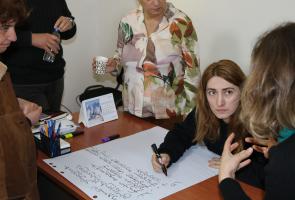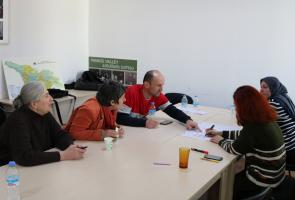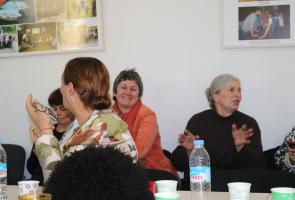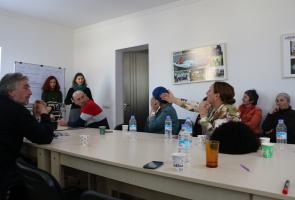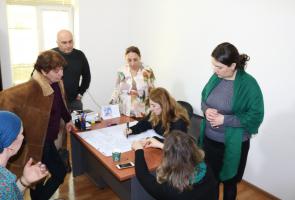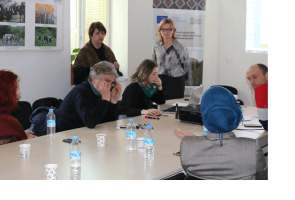News
Akhmeta LAG Executive Board begins work on Local Development Strategy (LDS)
25/02/20
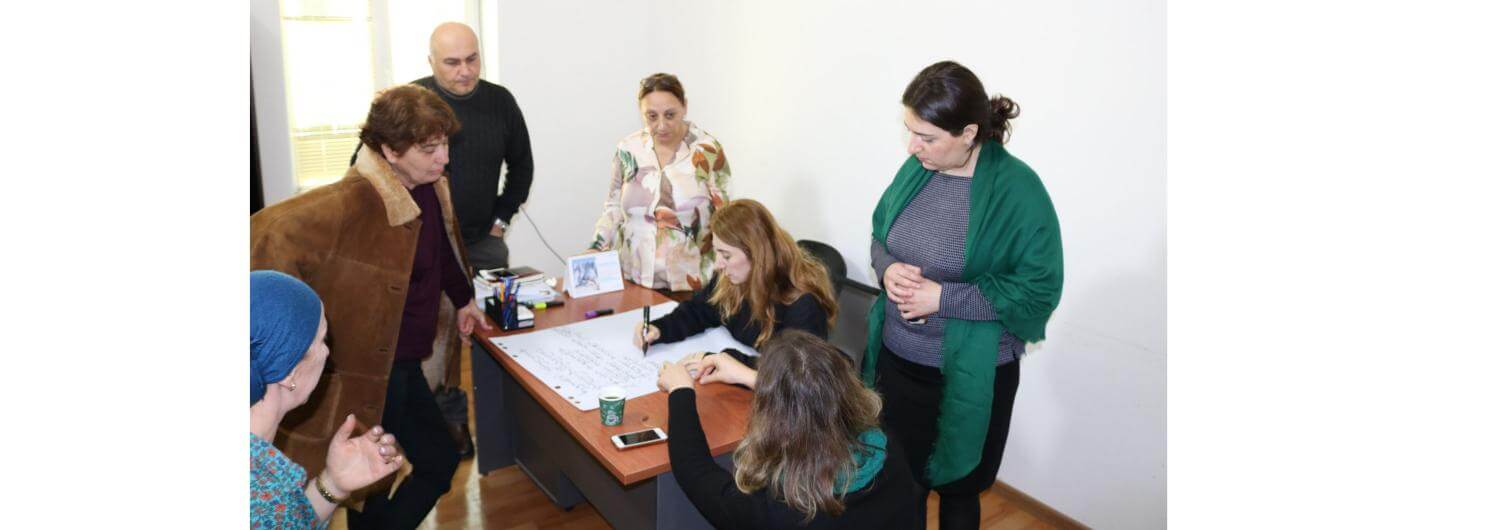
17-18 February 2020 – The recently elected Executive Board of the Akhmeta Local Action Group (LAG) had its first meeting under the EU-funded ENPARD project, Promoting inclusive and participatory local development in Akhmeta Municipality. The aim of this first official session of the LAG Executive Board was to begin the formulation of the Local Development Strategy (LDS) by identifying strategic areas of concern in the municipality and to agree upon an achievable vision for development. This vision and strategic direction will then be brought before the LAG General Assembly for their inputs and approval.
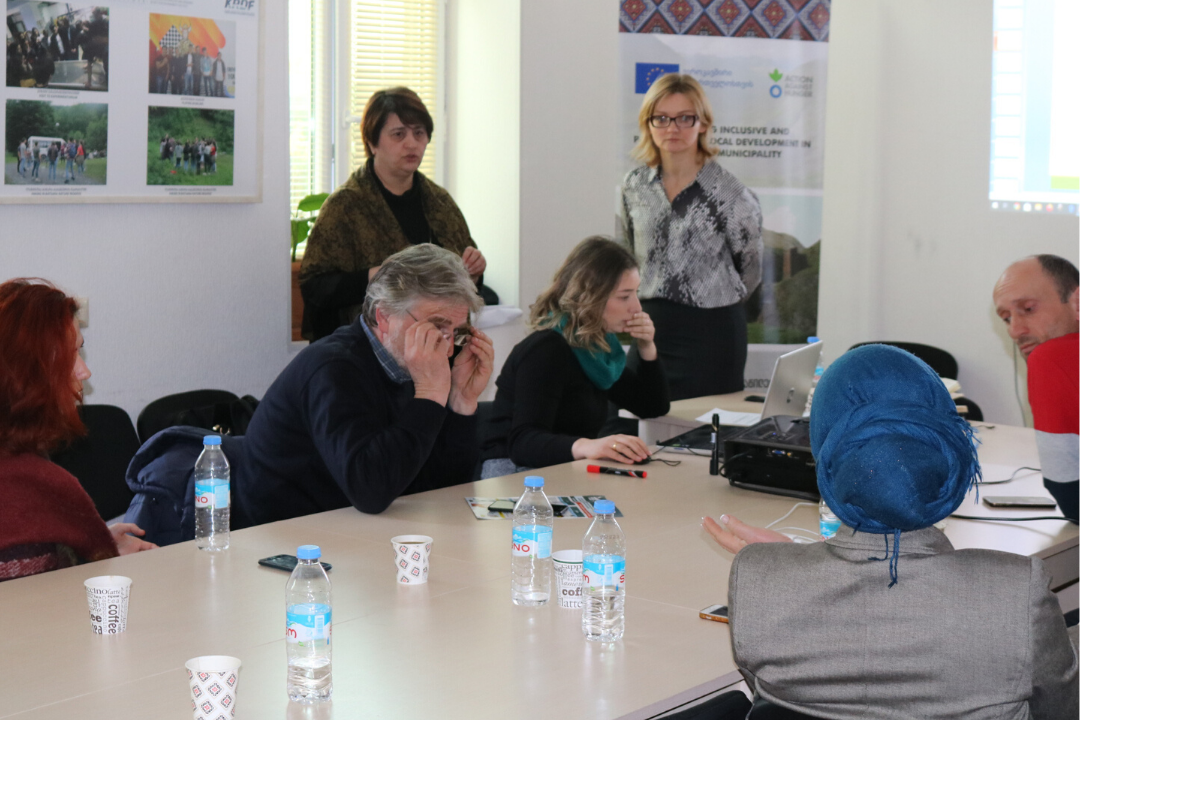
The two-day workshop was guided by an international expert on the LEADER-Community-Led Local Development (CLLD) approach, Lina Gumbreviciene from Lithuania, who has been an on-going presence in supporting the evolution of the local development process in Akhmeta and who has cultivated a strong rapport with the LAG members. Under Lina’s guidance, the board members engaged in a lively, interactive and dynamic debate while performing a SWOT analysis on the needs, opportunities and problems within the region. Through further brainstorming, group work and presentations by individual board members three critical areas of development rose to the top of the agenda: investment in agriculture; stimulating and supporting small and medium-sized businesses (including tourism); and improving social services.
The ENPARD project aims to promote the voices of community members in local development planning and project decision-making to improve the quality of life and economic conditions in Akhmeta Municipality. Through their work on the design and drafting of the Local Development Strategy (LDS), the Akhmeta LAG members are directly engaged in establishing a platform for change for their region.
One of the younger members of the Executive Board, activist and schoolteacher Luiza Mutoshvili, 30, brings to the table experience in strategic planning through her work as head of a local non-governmental organisation working with youth, the integration of minorities and civil engagement. She cites a lack of planning and co-ordination as a major impediment to development. “We have many resources, but we are not using them properly … we have no plan or strategy to develop the municipality, our people and small businesses. Coordination is essential to have any positive change”. New to the idea of working with different sectors, including the municipality, Luiza sees the LAG “as being core to the creation of a culture of co-operation and it is essential in providing a positive direction”.
Giorgi Albutashvili, 37, Mayoral Representative of the Sakobiano community which covers seven villages and who formerly worked as a city lawyer in the capital Tbilisi, sees great potential in the people and this project. “We need to alleviate the poor rural living conditions by creating opportunities for individuals, groups and organisations by bringing back and maintaining the unique traditions of the different ethnic, multi-cultural people of our region” he says. “With good, motivated people, a respect for our traditions and each other’s ideas, great things can be done”.
Another Executive Board member, Mikheil Ghanishashvili, 55, is a published writer of novels and poetry (ten books translated into seven languages). He used to split his time between living in Tbilisi and occasionally in his home village in the Ilto Gorge but is now permanently based in his home region. Speaking on the LAG process and the project in general, he says: “This is a very good project because, as I see it, the LAG is trying to identify opportunities, and while we have some official stakeholders like the municipality, it is this bottom-up approach that will be the most important thing…it is democratic and it is the people who know what the problems are that are identifying priorities and organising the projects to the benefit of the villages …”.
For Nazo Gaurgashvili, 60, a woman from the Pankisi Gorge, the focus should be on the provision of basic social services. An actor, dance teacher and choreographer, Nazo represents the private sector and believes that current local conditions hurt the people. “The water supply is a major concern that needs solving”, she says. “Our main source is a mountain spring which dries up in the summertime due to heat and over-consumption and we don’t know if it safe for drinking or not. A high-volume reservoir is required”. Other practical issues are that of waste management and street lighting. “Rubbish is often dumped on the riverbank. They used to burn it but now that is prohibited. We need rubbish bins and collection”, Nazo says. “We board members must be active, disciplined, respect the choices of the population and be fair in our decision-making … the population needs to trust us, and we must work hard to earn and keep that trust”.
The strategy development will continue in March, when the LAG will work on the action plan for the LDS and the document will be finalised.
The project is funded by the European Union as part of the third cycle of the ENPARD programme and is implemented by Action Against Hunger, Kakheti Regional Development Foundation and Tusheti Development Fund.
The European Union is supporting agriculture and rural development in Georgia through its ENPARD programme. The support is grounded in the best European practices in the field and involves improving livelihoods of rural communities through creating economic opportunities and promoting local public-private partnerships. Implemented since 2013, the main goal of ENPARD is to reduce rural poverty in Georgia. For more information, please visit: www.enpard.ge
